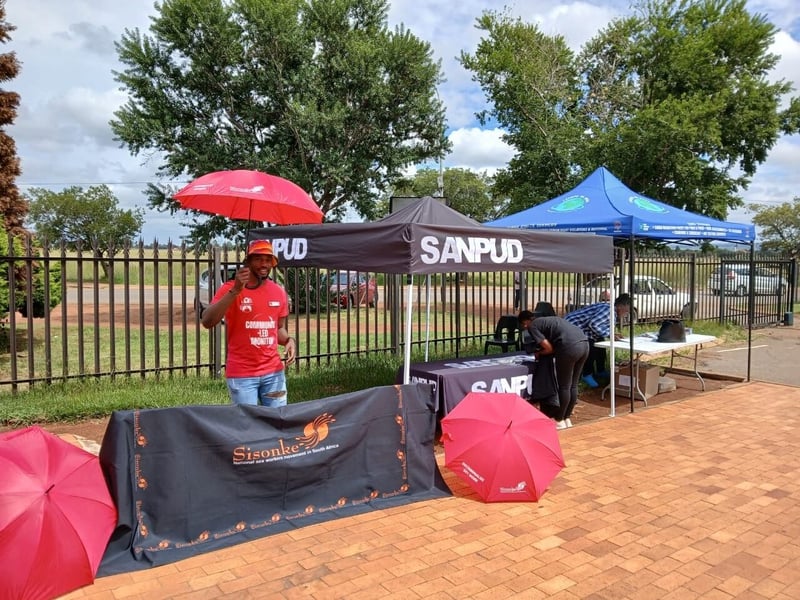SANPUD's Advocacy for Inclusive Open Clinics Through Community-Led Monitoring
Written by: Phumlani Malinga Save to Instapaper
At the beginning of February SANPUD and its partners held Open Clinics in Gauteng and the Western Cape where approximately 300 people who use drugs accessed healthcare services in a supportive and welcoming environment. The South African Network of People Who Use Drugs (SANPUD) has successfully used community-led monitoring surveys to amplify the voices of people who use drugs in their advocacy for their rights and improved access to public healthcare services. This approach reinforces SANPUD’s commitment to providing evidence-based services that effectively address the needs of people who use drugs in their diverse local areas.
Identifying barriers for people who use drugs accessing healthcare services
Community-led monitoring was funded by the South African National AIDS Council (SANAC). Trained community peers in Gauteng, KwaZulu-Natal, and the Western Cape used tablets to gather data from people who use drugs during surveys. This information was sent to the SANAC situation room for analysis. The findings revealed significant barriers for drug users in accessing healthcare services.
Natalie Jacobs, Community Engagement Officer in Cape Town, shared, "People who use drugs often avoid clinics out of fear of being turned away. During our Open Clinic Days, we had 28 attendees. People who use drugs accessed essential clinical services, including HIV, TB, STI, and Hepatitis testing. Notably, 12 women were able to get pap smears."
Open Clinic Days as the appropriate response
To address the needs highlighted in the community-led monitoring surveys, SANPUD organised Open Clinic Days to facilitate healthcare access for people who use drugs. These events occurred across various districts in Gauteng including Yeoville Clinic in Johannesburg, Westonaria Central Clinic in the West Rand and Motsamai Community Health Clinic in Katlehong as well as Chapel Street Clinic in Woodstock, Cape Town in the Western Cape. Each Open Clinic Day aimed to bridge the gap between healthcare facilities and the community of people who use drugs by providing speedy services and prioritising urgent healthcare needs. Collaborations with local service providers allowed for testing for HIV, TB, STIs, hepatitis, and cervical cancer screenings for women.
“We aimed to ensure services reached individuals in areas where healthcare resources are limited, breaking down stigmas. Many drug users said they rarely access public healthcare due to discrimination,” explained Lucky Ndlovu, PWUD Sector Coordinator for KwaZulu Natal.
Developing solutions with partners and stakeholders
SANPUD delivers comprehensive support to the people who use drugs in underserved areas through strategic partnerships and collaboration with other marginalised key populations, a range of stakeholders, and service providers. Furthermore, this ensures that the donor funding for life-saving services to people from marginalised key populations has a wider reach and is sustainable. For example, during the Open Clinic Day at Yeoville Clinic, SANPUD partnered with Tsohang Youth Project and the Anova Health Institute to provide essential healthcare services, while at the Westonaria Central Clinic in the West Rand, SANPUD partnered with Sisonke Movement, Tshepo Ya Bana Npo, and others. Another successful event at Chapel Street Clinic brought together representatives from the LGBTQI+ community, the CSF Disability Sector (ARRC), men who have sex with men (MSM), and healthcare professionals. These partnerships empower all parties involved, fostering a united front against discrimination and inequality without the fear of competition. Of the 300 people who attended the Open Clinics in the two provinces over two hundred people were tested while the rest were put in contact with the site managers to ensure their return for tests.
The Community- led Monitoring has been instrumental in amplifying the voices of people who use drugs, by fostering a platform where their experiences and insights drive meaningful change. This inclusive approach not only empowers individuals but also strengthens the overall effectiveness of SANPUD's advocacy initiatives, ensuring that the needs and rights of marginalised key populations are at the forefront of their work.
Submitted on behalf of
- Company: Communication Strategist
- Contact #: 0762212984
- Website
Press Release Submitted By
- Agency/PR Company: Communication Strategist
- Contact person: Phumlani Malinga
- Contact #: 0762212984
- Website
Get new press articles by email
A media specialist for drug policy advocacy networks that work to protect and promote the human rights of people who use drugs.
Latest from
- SANPUD Seeks Strategic Leaders to Join Peer-led Board
- How Criminalisation, Rights Erosion and Regulatory Gaps Fuel Deaths in Unregistered Rehab Centres
- Beyond Condemnation - Poverty, Alcohol and Childhood Substance Exposure in SA
- Peer-Led Action Must Be Central to South Africa’s Hepatitis Response
- Turning Airwaves into Action - Using Radio Interviews to Drive HIV Advocacy
- Nina Manzi Wellness Day taking place at the Bellhaven Harm Reduction Centre in Greyville
- SANPUD Ensures Voices of People Who Use Drugs (PWUD) Shape Drug Policy, Sustainable Funding and Research
- Funding Disruption for HIV and Harm Reduction Services Will Cost Lives So South Africa Must Rethink Our Priorities
- Empowering Nurses for Compassionate Care - Join the Online Workshop on the Pregnancy and Substance Use Toolkit
- Meaningful engagement between funders and beneficiaries charts a real path to progress
- SANPUD hosts Groundbreaking Interpol Training on GBV and Harm Reduction
- Community-Led Monitoring Leads to Empilisweni Clinic's Inaugural PWUD Open Day
- Public Event Promoting Healthcare Services Integration at local level to increase coverage of people from marginalised populations
- The Importance of Informed Decision-Makers in Harm Reduction
- Nani Manzi Showers at Belhaven Harm Reduction Service - A Lifeline for Improved Hygiene and Well-Being for PWID in Greyville
The Pulse Latest Articles
- Opinion Piece: Activating Leadership To Engage The Passive Workforce (February 11, 2026)
- Tchagra Trail Wilderness Consulting Launches A New Safari Experience In Photography And Tracking (February 9, 2026)
- Magic: The Gathering Releases Lorwyn Eclipsed (February 6, 2026)
- Back To Work, Back To Balance: Rethinking The 3pm Slump (February 5, 2026)
- Back-to-school Lunchboxes That Just Make Sense (February 5, 2026)
